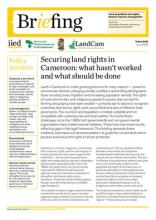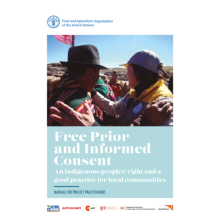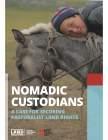/ library resources
Showing items 1 through 9 of 11.In Cameroon, commercial and infrastructural developments are exerting increasing pressure on land and natural resources, which is in turn exacerbating the risks to the rights of indigenous peoples.
Land in Cameroon is under growing pressure for many reasons — powerful commercial interests, changing climate conditions and shifting demographic flows including mass migration and increasing population density.
Au Mali, au début des années 1990, la décentralisation fut d’abord un acte politique permettant de proposer une solution viable au problème de la rébellion touarègue.
Large-scale land acquisitions have increased in scale and pace due to changes in commodity markets, agricultural investment strategies, land prices, and a range of other policy and market forces.
This Issue Paper No.2 is part of the series Making Rangelands Secure, a learning initiative supported by ILC, IFAD, RECONCILE, IUCN-WISP and Procasur.
This report highlights some of the human rights challenges which the Indigenous peoples in Tanzania, particularly Maasai pastoralists, are facing. It also proposes some areas of improvement in order to make Tanzania a better place for everyone, including indigenous pastoralists.
This manual is designed to assist development organizations to respect the right to FPIC when developing and implementing projects affecting Indigenous Peoples.
As part of the Global Call to Action in Indigenous and Community Land Rights, this brief puts the spotlight on the need to secure land rights for the world's pastoralists, as pastoralism is practised by an estimated 200-500 million people. Pastoralists manage rangelands that cover a quarter
Pagination
Land Library Search
Through our robust search engine, you can search for any item of the over 73,000 highly curated resources in the Land Library.
If you would like to find an overview of what is possible, feel free to peruse the Search Guide.









